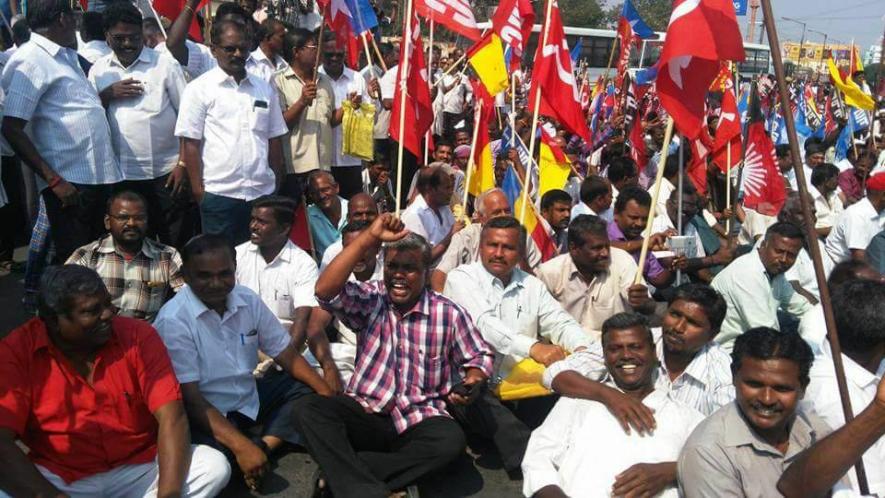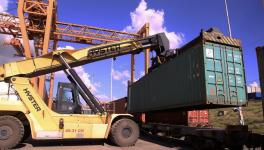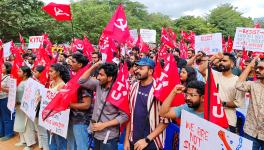#WorkersStrikeBack: How ‘Modern Times’ Are Squeezing Workers in TN’s Auto Hub

Image Used for Representational Purpose Only
[As lakhs of workers gear up for a historic All India Strike on January 8-9, called for by 10 central trade union, Newsclick brings to you glimpses of the lives of industrial workers in different parts of the country.
CHENNAI: In 1936, Charlie Chaplin released his film, Modern Times, a take on the working class life in a heavily industrialised society. Ever since, images of the beloved tramp squeezed between large mechanical wheels have spread laughter throughout the world. But, 82 years later, the ‘modern times’ that Indian workers are facing are nothing to be laughed about.
As the country prepares to witness one of the largest working class protests in its history on January 8-9, on the call of 10 central trade unions and several independent organisations, an industrialised state like Tamil Nadu is seeing big time preparations for the same in the automotive hubs that houses the who’s who of the sector, such as Hyundai, Yamaha India, Royal Enfield among others.
The countrywide strike call comes in the backdrop of various protests and strikes in the manufacturing hub of Tamil Nadu in the past one year. The protests were for demands such as unionisation rights, illegal lock-outs, victimisation among others. Royal Enfield, Yamaha India, MSI, Dungsun, etc are some companies where strikes and protests took place.
The Golden Goose
Tamil Nadu’s capital city Chennai is nicknamed the ‘Detroit of India’ due to the huge presence of automobile industries there. Many of these are subsidiaries of international giants, such as Hyundai and Yamaha.
According to a report published in Business Standard , Chennai has an installed capacity to produce one car every 20 seconds and one commercial vehicle every 90 seconds. This makes the state one of the major auto manufacturing hubs in the world.
The state accounts for 35% of India’s auto component production. The collective investment of major auto component manufacturers amounts to $553.85 million and they directly employ about 45,000 people through around 100 companies.
Hyundai Motor India, part of South Korean giant Hyundai Motor, is a leading manufacturing company in the with a capacity of 700,000 units. The company signed an MoU with the state this year on August to invest Rs 7,000 crore more for increasing production capacity. The government is expecting to get more investment in the sector and achieve this, more fiscal incentives and infrastructural facilities like rail, road, pipeline, etc are being widely offered.
But, this increasing interest to attract new companies and investors is inversely proportional to the amenities offered to workesr.
The Bitter NEEM Issue
Government schemes like NEEM (National Employability Enhancement Mission) help these companies to tap an unregulated labour force. The programme was envisioned as a solution to overcome the shortage in skilled labour. The idea is to give a person job training in a company which would help them develop a skill they lack. But, in effect, this also gives the companies a liability-free workforce.
“One of the reasons why our strike at MSI went on for long is because of presence of NEEM employees,” said Kannan Soundarrajan, district secretary, Centre of Indian Trade Unions (CITU), Kanchipuram. About 600 workers out of the total 1,100 workers in MSI fall under NEEM. So, when the 150 permanent workers went on a strike, the NEEM workers made up for this gap and production went on as usual.
The permanent workers were paid an average Rs 35,000, whereas NEEM workers were paid only about Rs 11,000, said an MSI. The scheme is formed in such a way that companies can effectively exploit workers and rake in profits.
As NEEM employees do not benefits like Employees State Insurance and provident fund, they are left to fend for themselves in case of accidents on factory floors. This helps the companies tap a huge labour force at very low cost.
Illegal Lockout of Dongsan
In a recent incident, the Hyundai tier-2 supplier Dongsan Automotive India, situated in Irungattukottai, moved its production to Dong Sung Automotive Pvt ltd, situated in Singadivakkam, near Kanchipuram. The workers were not informed about it and hundreds lost their jobs overnight. Many have been working there for more than 10 years.
“All we are asking is: give our jobs back,” Prabhu from Dongsan told Newsclick, adding “We are ready to work in Dong Sung as well. They give work to around 30 people from our company. Why are we not given any? I was paid Rs 33,000 at Dong Sung. I had 11 years of experience. No new company will take us since we are in our 30s.”
There are 113 workers like Prabhu who lost their jobs because of the illegal lockout.
Before the closure, the workers started noticing the tools and machinery being shipped out. They complained about this to the labour department and even filed a writ petition. But the company advocate assured the workers in court that there were no plans of closure. But gradually the workforce in Dongsan was reduced to the minimum, as the workers were cajoled to resign and join Dong Sung for the same wage. Some were forced to take voluntary retirement.
The company was closed when they had a workforce of just above the threshold of 100. As per law, any company with over 100 permanent employees needs to inform the labour department about full/partial closure or retrenchment. But this was not. On March 13, the employees found a notice on the factory gate about retrenchment, and that was it. The workers alleged that the company was not paying their EPF contribution since 2015, which amounts to about Rs 60,000 per worker, according to a report published in the TNLabour.
Four of these 113 workers lost their hands in accidents. In such a scenario, getting another job is nearly impossible today.
Wrath of Managements
Another major issue the workers face is the hostile attitude of management towards unions. In many automotive companies, the managements prefer communication through the works committees established by the company. They see unions as a threat. But most often these committees are not effective when it comes to negotiating with managements.
“Seven of our coworkers were suspended over petty reasons like taking one or two minutes extra for lunch time,” said an MSI worker, adding that they “were targeted because they were the office-bearers. After the strike, we are being threatened to transfer to harder work areas.
In DMC Automotive, Thiruvallur, a Korean company, the trainees formed a union as they had been working in the company for six years. They were joined by a few permanent employees to negotiate with the management about their working status. The company has not been making any employee permanent since 2012. The management started harassing one of the permanent employees who had joined the union, resulting in the worker attempting suicide inside the factory premises. Criminal charges were filed against the company later after a legal battle.
In 2016, Tamil Nadu witnessed one of the largest protests by contract workers. More than 4,000 workers from about 60 companies from three districts (Chennai, Kanchipuram and Thiruvallur) joined the protest by contract workers from NHK F Krishna Automotive Seating company, demanding permanent status.
Change is Coming
Despite these issues, workers in automotive industry in Tamil Nadu are forging a path of their own, step by step. In many companies, managements had to surrender worker demands.
The strikes in Yamaha India and Royal Enfield in Kanchipuram were settled in November after a long period of protests. The strike at Pricol, Coimbatore, went on for 100 days, and at MSI, for over 80 days. These struggles show how a forged front of workers can effectively bargain with the management.
“Forming a union definitely helped us,” said a worker from Yamaha India Motors. “About 750 employees in our company are part of our union now and the number is going up steadily. We formed the union to get our deserved respect from the management. Earlier we were bullied. Now they have started listening, though they try to pressure our leaders,” he added.
The upcoming countrywide strike on January 8-9 will serve to be a warning bell for the BJP-led government.
As Prabhu from Dongsan told Newsclick, “We voted for them (BJP) once because of their promises about job security and development. But this government failed in their promises. Never again!”
Get the latest reports & analysis with people's perspective on Protests, movements & deep analytical videos, discussions of the current affairs in your Telegram app. Subscribe to NewsClick's Telegram channel & get Real-Time updates on stories, as they get published on our website.
























